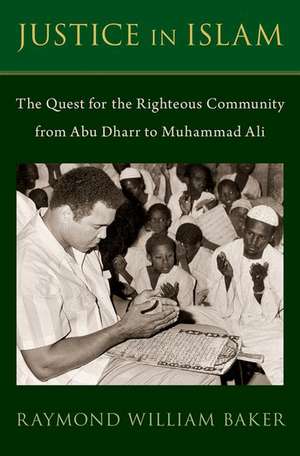Justice in Islam: The Quest for the Righteous Community From Abu Dharr to Muhammad Ali
Autor Raymond William Bakeren Limba Engleză Hardback – 13 oct 2022
Preț: 189.47 lei
Preț vechi: 230.56 lei
-18% Nou
Puncte Express: 284
Preț estimativ în valută:
36.26€ • 38.77$ • 30.23£
36.26€ • 38.77$ • 30.23£
Carte disponibilă
Livrare economică 17-24 martie
Preluare comenzi: 021 569.72.76
Specificații
ISBN-13: 9780197624975
ISBN-10: 0197624979
Pagini: 288
Dimensiuni: 240 x 163 x 32 mm
Greutate: 0.57 kg
Editura: Oxford University Press
Colecția OUP USA
Locul publicării:New York, United States
ISBN-10: 0197624979
Pagini: 288
Dimensiuni: 240 x 163 x 32 mm
Greutate: 0.57 kg
Editura: Oxford University Press
Colecția OUP USA
Locul publicării:New York, United States
Recenzii
Baker masterfully weaves together several critical threads in Islam -- the story of Abu Dhar, Islam's Jesus, and the works of some of the most important figures behind Islam's Awakening, ranging from the scholar Muhammad al Ghazalli to the athlete Muhammad Ali -- to demonstrate Islam's persistent emphasis on justice. This is a book of impressive scope and depth, its focus all the more necessary in the world that today's Islam finds itself.
In a captivating reading of the contemporary Islamic Awakening, Baker takes us on a journey to discover the normative strength of Islam. A series of vignettes show the enduring influence of Abu Dharr al-Ghifari on an array of contemporary Islamic intellectuals. Baker boldly treads on ground that few are capable of venturing while drawing on decades of personal exchanges in the Muslim world, interdisciplinary erudition, and a sensitive study of texts. Baker is on a scholarly quest for the 'Muslim Jesus' likely to resonate with diverse readers that have been inquisitive about Islamic renewal's reshaping of thought and society in the Muslim world. Baker does a fine job, succeeding to imbue his oeuvre's pages with much food for thought and comparative content for student and critic.
Baker correctly observes that the literature on political Islam has favored analysis of radical groups and radical Islamic ideas. To the extent that there has been discussion of more moderate forces, it has focused on organizations and their political activity (for example, on the Muslim Brotherhood's rise and development) rather than on the ideas that produced these movements and shaped their development. Baker's book helps to fill this gap in the literature. It provides a rich, careful, and serious consideration of the intellectual project of reformist Islam as embodied by six prominent figures in this effort.
The message of the book is essentially that a study of Islamic intellectual history will provide the West with a better understanding of the Muslim world and minimize the policy bungle the West too often suffers from.
In a captivating reading of the contemporary Islamic Awakening, Baker takes us on a journey to discover the normative strength of Islam. A series of vignettes show the enduring influence of Abu Dharr al-Ghifari on an array of contemporary Islamic intellectuals. Baker boldly treads on ground that few are capable of venturing while drawing on decades of personal exchanges in the Muslim world, interdisciplinary erudition, and a sensitive study of texts. Baker is on a scholarly quest for the 'Muslim Jesus' likely to resonate with diverse readers that have been inquisitive about Islamic renewal's reshaping of thought and society in the Muslim world. Baker does a fine job, succeeding to imbue his oeuvre's pages with much food for thought and comparative content for student and critic.
Baker correctly observes that the literature on political Islam has favored analysis of radical groups and radical Islamic ideas. To the extent that there has been discussion of more moderate forces, it has focused on organizations and their political activity (for example, on the Muslim Brotherhood's rise and development) rather than on the ideas that produced these movements and shaped their development. Baker's book helps to fill this gap in the literature. It provides a rich, careful, and serious consideration of the intellectual project of reformist Islam as embodied by six prominent figures in this effort.
The message of the book is essentially that a study of Islamic intellectual history will provide the West with a better understanding of the Muslim world and minimize the policy bungle the West too often suffers from.
Notă biografică
Raymond William Baker is Professor Emeritus of International Politics, Trinity College, Hartford, CT and Board Director, International Council for Middle East Studies, Washington, D.C. He is the author of many books and scholarly articles, including Islam Without Fear (2004) and One Islam, Many Muslim Worlds (2015).
